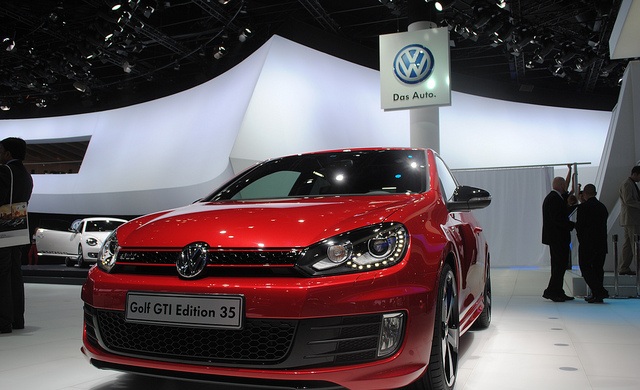
Japan’s leading vehicle manufacturer Toyota (NYSE:TM) has recaptured the crown of the world’s leading vehicle manufacturer as it heats up the competition with its Western competitors; General Motors (NYSE:GM) and Volkswagen AG (VLKAY.PK). However, with (most of) the crisis now in its past, Toyota is operating at full capacity and was quick to regain the market leadership. And now the stage is set for a regional competition to ensue between it and Volkswagen.
Globally, Toyota sold 9.7 million vehicles, followed by GM with 9.29 million vehicles and Volkswagen with 9.07 million units. Toyota had been the global leader from 2008 till 2010 but the massive flooding in Thailand, earthquakes in Japan and all-too-frequent recalls of hundreds of thousands of vehicles saw the company being pushed to the third spot in 2011.
Some of Toyota’s gains in 2012 were wiped out in the second half of 2012 by the drop in demand from China after the Senkaku/Diaoyu island dispute boiled over into the streets. China is the third “million vehicles” market for Toyota but the effects of Chinese woes were completely offset by the U.S which served as a strong market for Toyota in 2012, where its market share increased from 12.9% to 14.4%.
Despite a persistent anti-Toyota campaign being run in the U.S. press and waged through the NHTSA the moment Toyota was able to fill supply after dealing with the natural disasters it was able to easily out compete GM on GM’s home turf despite the Yen being at multi-decade highs. That’s how strong Toyota’s brand loyalty is and how poor its competition’s is.
In Japan sales increased by 25%, while international sales increased by 19%, overall. The depreciating Yen accounted for $384 million in the firm’s operating profits. The company was in good shape under a strong Yen, what do you think is going to happen under a 20% weaker Yen? This is why one should become more bearish on its competition. But, Volkswagen will have a lot to say about that.
Car sales in the U.S. increased by 13.4% in 2012, the highest rate since 2007. This was achieved on a mix of loosening credit standards and a fleet at a record old age. According to the latest data released by Wall Street Journal, Toyota holds a 15.1% market share with sales of 157,725 units in January 2013, whereas, Volkswagen’s share is just 2.8%. The fight for dominance in the global car market will not be fought in the U.S. where the Ford F-150 and Chevy Silverado are the best-selling vehicles in the country. This fight will be fought around the world and it will pit those companies with not only superior technology and manufacturing prowess but also design efficiency.
|
Jan-12 Market Share % |
Jan-13 Market Share % |
Change % Points |
|
|
GM |
18.4 |
18.7 |
+0.3 |
|
Ford |
14.9 |
15.9 |
+1.0 |
|
Toyota |
13.6 |
15.1 |
+1.5 |
|
Chrysler |
11.1 |
11.3 |
+0.2 |
|
Honda |
9.1 |
9 |
-0.1 |
|
Nissan |
8.7 |
7.8 |
-0.9 |
|
Volkswagen/Audi |
4.0 |
3.8 |
-0.2 |
In China however, the biggest auto market of the world with a growth rate of 7.1% and sales of 15.5 million passenger cars in 2012, the market dynamics are completely different. While Volkswagen is still an also-ran in the U.S. it is Toyota and GM’s biggest competition. Volkswagen saw a massive surge in demand in 2012 with a 24.5% increase in shipments of 2.81 million vehicles, just about 30,000 short of GM’s record sales. Meanwhile, Ford also recorded a 21% increase in its sales in China in 2012 to 626,616 units.
Chinese consumers seem to favor American and German auto manufacturers, albeit for different reasons. Volkswagen is capitalizing “first time car buyers” and “opposition of Toyota” sentiment in China apparently as Toyota’s sales dropped 4.9% overall to ~840,000 vehicles. GM, on the other hand, is simply the bargain brand and has enjoyed first mover advantage in China. According to China Association of Auto Manufacturer, Chinese auto market is estimated to grow at 7% in 2013 and could very well surpass the 20 million units mark. As time goes on, however, Volkswagen total cost of ownership and vastly superior internal economics should erode GM’s market position there. Toyota will have to contend with the latest wave of anti-Japanese sentiment and VW is more than ready to pounce on any competitor’s missteps at this point.
China remains a top priority for the three companies. By 2020, China’s annual vehicle sales could reach 30.6 million which would make it twice as big as the U.S. market. There is plenty of room for growth here and a lot could change in the long run. For Toyota, the new opportunities for it lie around ASEAN and India where the weak Yen will help cement its dominance in fast-growing markets like Thailand, Malaysia and Indonesia. For India, the changes to the diesel subsidy should allow Toyota to gain ground on Honda (NYSE:HMC), Suzuki and Tata who all invested heavily in the diesel boom. As those economics shift Toyota’s lead in hybrids and fuel-efficient small cars will serve it well.
In the long-run, however, investors should be looking at the global auto industry from the perspective of a show-down between Toyota and Volkswagen as the two giants leverage both their cash flow, operational and design prowess to the hilt pushing smaller players to the brink. If VW’s MQB system fulfills even half of its promise to streamline the design/engineering/production and maintenance of its cars it will make it difficult for most others to compete, even in the face of a stronger Euro.
|
|
TM |
VW |
GM |
|
Stock 6M |
20.7% |
40.4% |
39.5% |
|
P/E |
16.21 |
3.7 |
10.5 |
|
EPS |
6.04 |
12.34% |
2.66 |
|
Yield |
1.40% |
N/A |
N/A |
|
ROA |
2.88% |
2.52% |
2.90% |
|
ROE |
7.96% |
32.19% |
13.26% |






